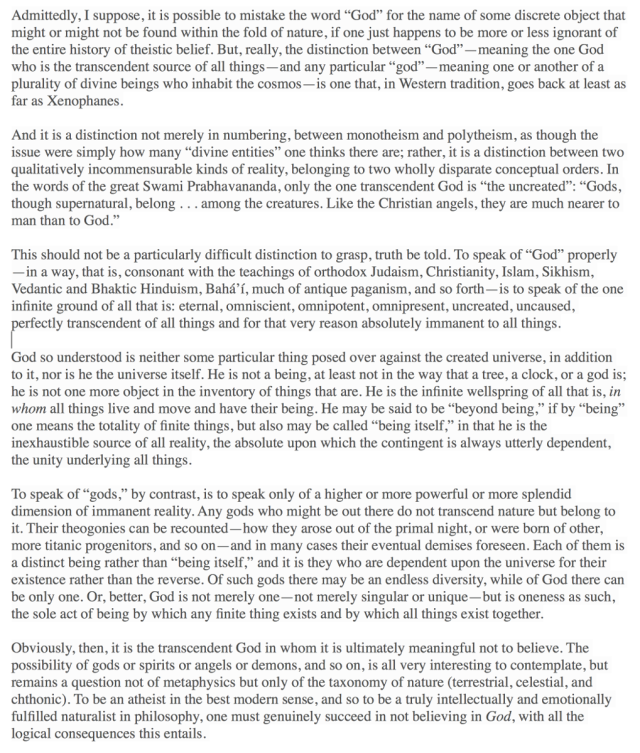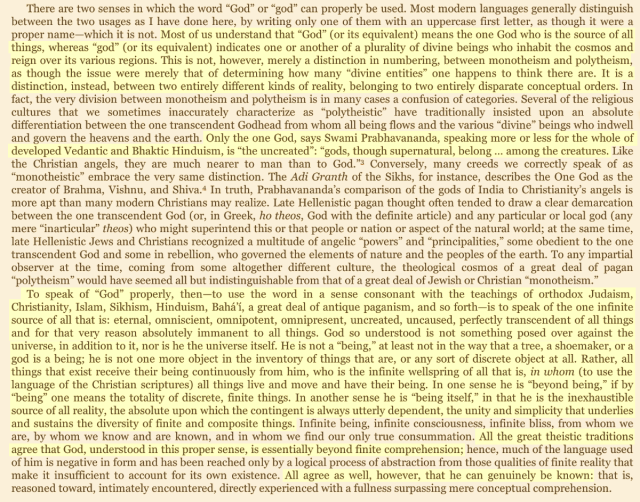[NOTE: This post is merely the second half of my very long post “Which God Exists?” This part is so critical that I want a place to be able to send people who need to understand this directly.]
In any serious discussion about theism, it is absolutely crucial to distinguish between God and the gods. If you don’t understand this distinction, you will literally never understand what serious theists are talking about. God is, by definition, the Absolute. The one, absolute, unconditioned ground and source of all that is; the Alpha and the Omega, as Christian scripture puts it. Perhaps there are, as Hindus believe, thousands or even millions of gods; perhaps there are not. But if there are, these gods, like everything else, receive their existence and being from Brahman, which is the absolute reality beyond all (mere) gods, and as Thomas Aquinas would say, “Et hoc omnes intelligunt Deum”, “and this everyone understands to be God.”
This is the reason we distinguish God with a capital G, from gods with the lower case g: gods are beings, entities, that—if they exist—exist as part of the totality of reality, the total ensemble of things that are. There can thus be many of them, or a few, or one, or none, and they may or may not exist, and these are all empirical questions: if they do exist, they do, and if they don’t, they don’t. But God is not a being or thing or entity that exists in the total ensemble of things that exist; rather God is the ground and source of the total ensemble of things that exist. It is, strictly speaking, improper to say that “God exists,” because the word “exists” fails to capture adequately the being of God (as does the word “being”; as do all words). This is also the reason why the existence of God is not an empirical question. It is not the case that God may or may not exist. If God exists, then God necessarily exists. Indeed, if anything exists, God necessarily exists. Existence or reality itself is an effect of God’s being.
When one talks about God, one needs to talk in a way that is utterly unlike talk about anything else, because God is not a thing among other things. One must say things like Plato, that “The Good is beyond being, exceeding it in dignity and power.” Or like St. Dionysius the Areopagite, that “It is wrong to say God does not exist. It is wrong to say God exists. But it is more wrong to say God does not exist.” This is not, as some will claim, a fallacy of special pleading. A fallacy of special pleading occurs when one asks that something which is the same as other things be treated as if it is different, or special. But God cannot be treated the same as anything else. If God were the same as anything else, or commensurate with anything else, He would not BE God. There is no special pleading involved in speaking of that which is utterly unique as if it were different from everything else; it must be so, and necessarily so, if it is at all. Even the dimmest atheist should be able to grasp this: IF there is a God in the way theists mean that term, THEN nothing else will be or could possibly be comparable to God. One thing God cannot be, if you have understood the term at all, is one among many, an entity for which it is anything other than a category mistake to ask “Which one of a kind is it?”
The answer must be either “Go learn what is meant by the term ‘God’” or else “Given that God exists, which theistic tradition gives the most adequate account of God?”
I subjoin two texts from the theologian David Bentley Hart, who draws the distinction between God and gods very cogently. Please read them.



“What serious people mean by God” should be something you understand before you enter the discussion.
LikeLike
[…] of course, dear readers, as you should all catch by now, Josh is confusing God with gods, a catastrophic category […]
LikeLike
Hi! I’m a Muslim but hence we believe in the same God, I would like to ask, what did you mean when you said “Perhaps there are, as Hindus believe, thousands or even millions of gods; perhaps there are not.” What would you say is a god? Is it a human which is getting worshipped? Does it have any divinity?
LikeLike
I mean by “gods” in this context spirits or jinn. They are, in some regards, “higher” entities than man, because they are pure spirits, but they ought never to be worshiped (that is where I would say the Hindus go wrong). Only God should ever be worshiped. In fairness to Hindu as well as pagans, I do not think we would *know* for sure that we are not to worship *only* the one God, if He had not revealed this through the prophets.
LikeLike
Reblogged this on Cyber Penance.
LikeLike